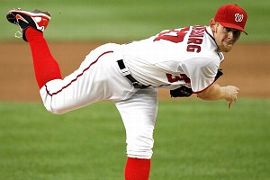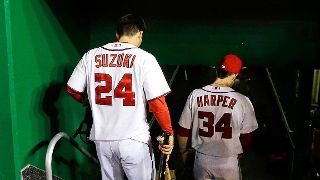|
Early Saturday morning, minutes after his team suffered a devastating, season-ending loss to the St. Louis Cardinals, Washington Nationals general manager Mike Rizzo stood his ground on his much-debated decision to shut down starter Stephen Strasburg. "We'll take the criticism as it comes, but we have to do what's best for the Washington Nationals," Rizzo told reporters. "And we think we did." For the long term? Perhaps one can argue that cutting Strasburg's season short will enable him to better recover from his Tommy John surgery and give him a greater pitching life. In the short term, financially speaking, shutting down the phenom could have cost the team tens of millions of dollars. Assuming Strasburg, who went 15-6 on the year, was in the rotation, and was able to help lead the Nats to the World Series title, the team would have seen at least $25 million in incremental business, estimates Vince Gennaro, author of "Diamond Dollars: The Economics of Winning In Baseball." "This is not a one-year effect," said Gennaro, who has consulted for Major League Baseball teams. "If the Nats added 3,000 season-ticket holders if they won the World Series, they would get the revenue from 3,000 for one year, then say, another 2,500 for the second year, and 1,700 the third year and so on. Where people tend to underestimate the impact of winning is that there is a multiyear impact." Bill Sutton of Bill Sutton & Associates -- a sports consulting firm whose clients include the Pittsburgh Pirates, the Orlando Magic and Madison Square Garden -- says the Nationals wouldn't have even needed to win the World Series to see that bump. He says getting to the Fall Classic would have been good enough. If the team did that, Sutton thinks the Nationals would have sold at least 3,500 season tickets and perhaps as many as 6,000. With an average season ticket of about $2,500, that would equal at least $8.7 million, and Sutton says getting to the World Series would enable the team to charge 7-10 percent more for tickets across the board. Mixing in future ticket sales, sponsorship, concessions and other ancillary revenues from a trip to the World Series, Sutton puts the lifetime value of a title or even a World Series appearance at $35 million to $40 million.  The Nationals could afford to go back to the typical markup as their ticket market heated up. The team has also used food discounts to lure fans into the ballpark ($1 hot dogs, $5 for beer and peanuts). The Nationals could afford to go back to the typical markup as their ticket market heated up. The team has also used food discounts to lure fans into the ballpark ($1 hot dogs, $5 for beer and peanuts).
Even though Washington Redskins quarterback Robert Griffin III has brought some excitement into the greater D.C. sports world, the Nationals were in the driver's seat. "The Redskins have been irrelevant for 15 years and have some resentment built up due to [owner] Dan Snyder," said Nick Cubero, co-owner of the Ticket Experience in Houston, which buys and sells Nationals tickets. "The Wizards have been irrelevant since the 1970s. The Capitals had scooped up some casual fans, but they also have choked in the playoffs. The Nationals are the thunder of Major League Baseball. The fans are just now coming around and supporting them. They got bad news in September with the Strasburg dilemma, and now the casual fan just took a giant stomach punch from that game last night." Cubero says he believes all is not lost, as the general public is well aware of the star power that makes up this team, from Strasburg to Jayson Werth to Bryce Harper. Bernie Mullin, CEO of The Aspire Group, a sports consultancy firm, thinks the potential loss is closer to $65 million to $75 million. Mullin says he thinks the average season ticket, including premium areas, is closer to $3,000. He thinks the Nationals could hold 3,000 new season-ticket holders over five years for a $45 million gain. Adding parking, food and beverage, and sponsorships leads Mullin to push his estimate as high as $75 million. Some insiders believe the lost opportunity depends on how the Nationals react. "If they estimated a loss of 3,000 to 5,000 new season-ticket holders, I think they could still close at least half of these," said Lisa Delpy Neirotti, associate professor of Tourism and Sport Management at George Washington University's School of Business. "Perhaps they should offer a second-year playoff appearance, and if they do not make it, offer some percent off the following season. This could be dangerous, but other teams have done it."
|

